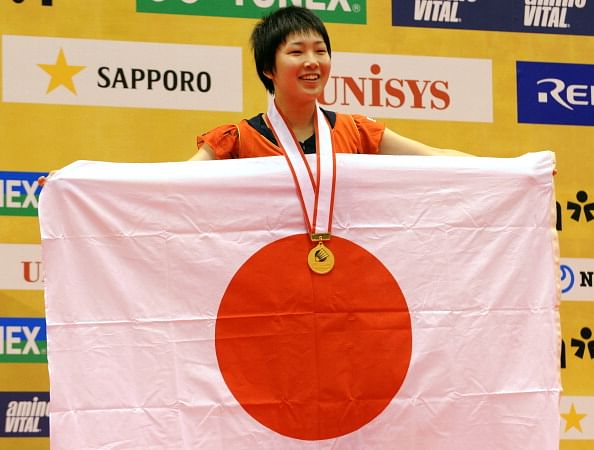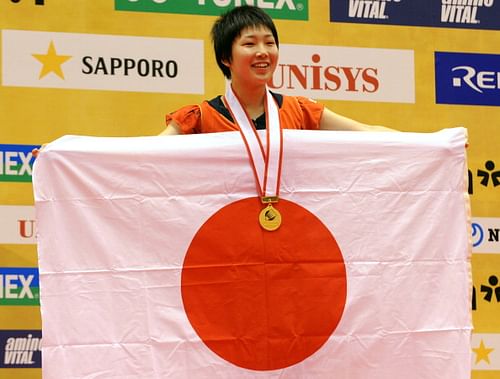
Akane Yamaguchi signals generational shift in women’s singles

16-year-old Akane Yamaguchi of Japan (R) shows her national flag on the podium after her women’s singles final at the Japan Open 2013 in Tokyo on September 22, 2013. Yamaguchi defeated compatriot Shizuka Uchida 21-15, 21-19. (Getty Images)
It’s hard to think of another period in recent history as exciting as this one. The last two weeks have been exhilarating for women’s singles.
The youngest-ever women’s singles winner of a Superseries was crowned on Sunday. Akane Yamaguchi, just 16, capped a dreamlike week to finish winner at her home Yonex Open Japan Superseries. In doing so, Yamaguchi became the first Japanese player to win the tournament in its 32-year history.
A week earlier, we saw Porntip Buranapraserstuk, the not-so-accomplished 21-year-old, power her way into the final of the China Masters, fighting past Olympic champion Li Xuerui in the semi-finals. Yamaguchi and Porntip are two of a cast of characters changing the existing power structure of women’s singles.
To Yamaguchi first. School kids fantasise about winning tournaments on home soil, in front of adoring home fans, and that is exactly what Yamaguchi did on Sunday. Her campaign was indistinguishable from a schoolgirl’s fantasy. Ranked 145, and chiefly with accomplishments in junior badminton to her credit, Yamaguchi started off by winning her two qualifying round matches to enter the main draw.
Once there, she took on fellow-Japanese qualifier Ayumi Mine, whom she quelled in three games. Next up was eighth seed PV Sindhu, but Yamaguchi destroyed the World Championships bronze medallist in the first game – allowing her opponent to score just six points – before wrapping up the tie 21-17 in the second.
Against senior compatriot Yui Hashimoto – who earlier in the year had beaten Saina Nehwal at the India Open – Yamaguchi was destructive from the beginning, using her speed and power to quickly dismantle Hashimoto. Next up was the semi-final against defending champion Tai Tzu Ying, like Sindhu a top-ten player.
Yamaguchi was lucky to beat Tai, for the defending champion was let down by a poor overrule from the chair umpire – but to the challenger’s credit, she saved six game points to clinch the first game and the match.
Meanwhile, in the other half, the unthinkable had happened – Shizuka Uchida, an unseeded 24-year-old, had beaten former world champion Wang Yihan to make the final. Yamaguchi comfortably overcame Uchida to crown herself the youngest Women’s Singles winner of a Superseries.
We have possibly seen the arrival of a new star. Yamaguchi shows all the qualities of a teen prodigy, but of course, only time will tell if she can fulfil the potential she richly displayed. What’s particularly significant is that she is of short stature, just 5 foot 2”, but she makes up for that with her other attributes. Her muscular legs power her speed and attacking game; she also appears to be mentally tough, as she demonstrated against Tai Tzu Ying by saving six game points.